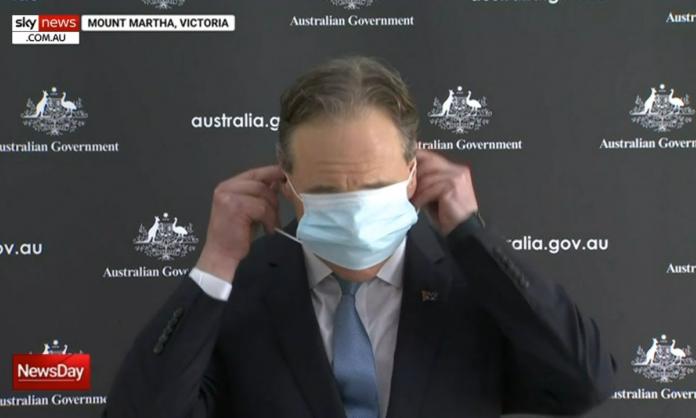Six months ago, Scott Morrison declared a coronavirus pandemic. At the time, it seemed to suggest the he was ahead of the curve in dealing with the virus. The government released a “coronavirus emergency response plan” and assured us that it was “very comprehensive”.
But we soon learned that, at every key juncture, Morrison hesitated to take decisive action, putting business interests ahead of our health. He was slow to stop travel from Italy and then the United States, despite the virus being out of control in both countries. It wasn’t until six weeks after the first confirmed case in Australia that a universal travel ban was implemented. Morrison opposed the closing of schools, his government became a joint claimant in Clive Palmer’s legal action against the Western Australian border closure, and he criticised other states for similar closures even when it was clear that they were preventing the spread of the deadly virus.
The government was slow to prepare the health system. On 11 March, it announced that 100 testing centres would be set up—but this took two months. It struggled to secure a decent supply of personal protective equipment. While some state governments and health experts argued for a “stop the spread” strategy, Morrison meekly talked about “slowing the spread”. Meanwhile, there have been hundreds of deaths in the appallingly underprepared and under-resourced private aged care system, which is overseen by the federal government.
We all knew that privatisations over the last decades have been a disaster. But the Victorian debacle was no less shocking—the Labor government outsourcing quarantine arrangements to private security firms and private hotels, directly resulting in the second wave that has gripped the state for months, cost hundreds of lives and destroyed thousands of livelihoods through a necessary but avoidable second lockdown. Premier Daniel Andrews has talked about the problems of workforce casualisation. But he says the issue is a conversation for when the pandemic is over—which means little, if anything, will change.
We’ve learned that big business quickly grows tired with saving lives when profits are at stake. Corporate Australia has consistently pressured state governments to relax health measures as soon as possible—indeed, while the quarantine disaster is at the heart of the second wave in Victoria, industry groups put tremendous pressure on the state government to ease restrictions, which it did before we knew that the virus was spreading through the suburbs.
Yet capitalists and the Liberal federal government are again piling pressure on the Victorian government to announce a roadmap out of lockdown while community transmission is not yet under control. Qantas boss Alan Joyce and the Business Council of Australia have been campaigning against interstate border closures, often under the guise of needing a more nationally “consistent” border policy. Clive Palmer, one of the richest people in the country, is threatening to bankrupt the Western Australian government over a decade-old mining dispute, while bringing extra pressure through a legal challenge to its border closures.
We’ve learned that, while the bosses try to reopen the economy for the sake of their profits, working-class people are suffering the brunt of the infections, three-quarters or more of which are acquired in workplaces. All of the tremendous wealth available throughout the country could have been mobilised to make sure that essential services were provided and everyone’s needs were met while we dealt with the outbreaks. But that would have required an attack on the right of capitalists to hoard society’s resources. We have learned that not even a once in a century health crisis is enough to question the logic of the capitalist economy.
We’ve learned that the wealthy often are able to get exemptions from the bans on overseas and interstate travel. Melbourne-based millionaire Mark Simonds was granted one so that he and six others could sail a luxury yacht to Queensland. While the exemption was finally withdrawn (only after the journey was completed), the Queensland chief health officer noted that she knows “about a number of super-yachts that have come into Queensland” and provided this excuse: “We’re quite an important place for repairs for a lot of those super-yachts—we have a significant industry in that”.
We’ve learned that, while the rest of us are still reeling, the rich are preparing for the future. The Australian Financial Review reported that the super-rich are investigating how they can beat travel bans in the future or move to safer countries. Companies specialising in so-called citizenship-by-investment programs have reported a significant increase in interest. One firm, Henley & Partners, has had a 49 percent increase in new inquiries since the beginning of the year and is opening new offices in Africa and India.
And while hundreds are allowed to attend sporting events and pubs, a protest of 200 people spread across an entire university campus in Sydney was banned and fines were issued by the police under the rationale that protesting is not an approved activity. So we’ve learned that governments will use their special pandemic powers to attack political opposition.
One thing we’ve definitely learned: effectively dealing with a crisis like this requires changing the way we live. That’s not just about social distancing and masks. It’s about making sure that the people who do all the work to keep society running don’t have to choose between a pay cheque and their health and that our economy is run for human need, rather than private profit.









